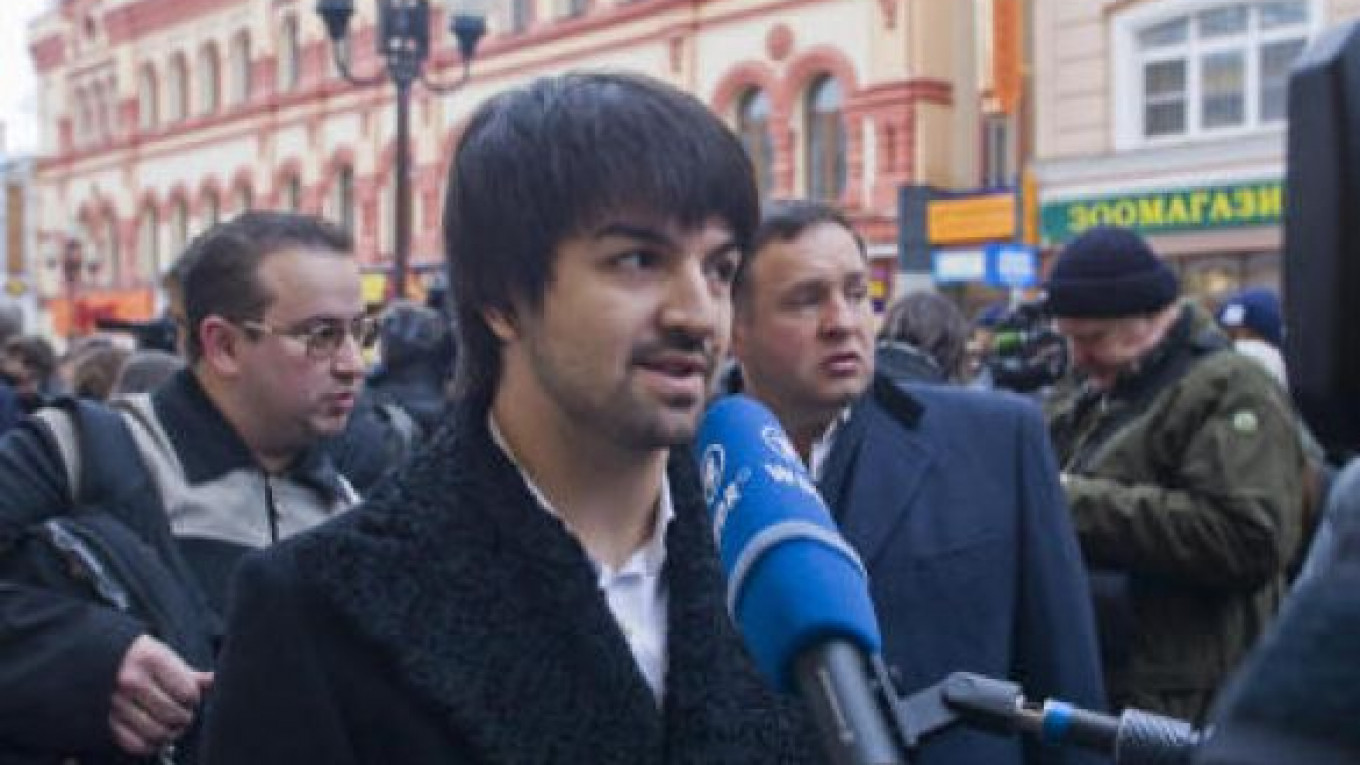A lawyer involved in several high-profile cases was accused by investigators Thursday of bribing witnesses and interfering in court proceedings in what he says was an attempt to remove him from the trials he is involved in.
Chechen lawyer Murad Musayev, 30, gained prominence in 2009 after a jury acquitted his clients, the suspected murderers of prominent journalist Anna Politkovskaya. Musayev has also been defending one of the suspected leaders of an organized crime group, Vyacheslav Tsepovyaz, as well as the suspected killer of Yury Budanov, a colonel who fought in the Chechen War.
Budanov was sentenced to 10 years in prison for murdering an 18-year-old Chechen girl. Following his release, he was killed in central Moscow in June 2011, with Chechen insurgents claiming responsibility for the crime.
It is the Budanov case that landed Musayev in legal trouble. According to the Investigative Committee's spokesman Vladimir Markin, Musayev bribed witnesses in the case to get them to give false testimony and thus vindicate the suspect on trial, Yusup Temerkhanov.
In a telephone interview with The Moscow Times, Musayev said that during the Budanov trial he was constantly harassed, with his phone tapped and his day-to-day activities monitored by unidentified men. He also received threats and insults on his phone, he said.
“Ever since I began practicing as a lawyer, I have always gotten hints that if I were more cooperative, I would get certain benefits,” he said. “If not, I could be in danger.”
Investigators said that Musayev had acted as part of an organized group, meaning his potential sentence would be more harsh, with he and his accomplices facing up to nine years in prison.
Musayev's colleague and partner on his legal team, Daria Trenina, was also accused of bribing a witness in January 2013. According to Musayev, this was a serious warning for him at the time.
“When they put pressure on me they know it is hopeless, since it is not possible for me to lie and not stand for the truth,” he said. “But when they target my colleagues, clients and even jury members, by propagating this dark PR against me, this is something different,” he said.
Trenina was accused of giving 100,000 rubles ($3,000) to Alexander Yevtukhov, a witness who saw Budanov's murder, in order for him to say that the murderer was a blonde Slavic-looking man, a description which is the exact opposite of the suspect's appearance.
Another witness, Ruslan Fataliyev, confirmed in a video published on the LifeNews website that he had received 15,000 rubles from Musayev to come to court and testify that “he had not met the suspect and had not seen him at the site of the murder.”
Both Trenina and Musayev confirmed that they had sent money to the two witnesses, but said it was because they “live far from Moscow” and could not afford the transportation costs.
“One is a driver and another is a lay worker, so they would not be able to come to Moscow from Novosibirsk and Volgograd at their own expense,” Musayev said.
“We did not have to pressure them to give false testimonies,” Trenina said by phone. “We only wanted them to come and repeat what they had already said to investigators during the preliminary inquest,” she said.
“Fataliyev was detained and beaten up in order to film this video with him,” she added.
Thursday's accusations against Musayev coincided with new developments in the other high-profile cases he is currently involved in.
The suspects from the 2009 Politkovskaya trial who were originally acquitted are now going through another trial after the Supreme Court overturned the previous ruling. Musayev is once again acting as the suspects' defense in the trial.
After a month of adjournments, the judge suddenly decided to resume hearings Thursday, the same day the jury members in the Tsepovyaz case, which Musayev is also involved in, retired to deliberate a verdict in Krasnodar.
“By bringing charges against me, the investigators are trying to blacken my reputation in the jury's eyes,” Musayev said.
He could not name individual investigators or representatives of law enforcement agencies that were targeting him, but said that a few months ago he was approached by an intermediary who asked him to step down from the case in exchange for security.
“There is nobody I answer to but God,” he said. “So my answer was negative.”
Several investigators told Musayev that he had already caused them “a lot of trouble.” In 2012, he defended Moscow music teacher Anatoly Ryabov, who was accused of sexually harassing his students. The teacher was acquitted.
“Perhaps the anger against me has reached the critical mass,” he said. “But the problem is that while this particular action is targeted against me, none of it would be possible in a functioning judiciary system: all the blackmailing, eavesdropping, all the media campaigns and so on.”
Contact the author at i.nechepurenko@imedia.ru
A Message from The Moscow Times:
Dear readers,
We are facing unprecedented challenges. Russia's Prosecutor General's Office has designated The Moscow Times as an "undesirable" organization, criminalizing our work and putting our staff at risk of prosecution. This follows our earlier unjust labeling as a "foreign agent."
These actions are direct attempts to silence independent journalism in Russia. The authorities claim our work "discredits the decisions of the Russian leadership." We see things differently: we strive to provide accurate, unbiased reporting on Russia.
We, the journalists of The Moscow Times, refuse to be silenced. But to continue our work, we need your help.
Your support, no matter how small, makes a world of difference. If you can, please support us monthly starting from just $2. It's quick to set up, and every contribution makes a significant impact.
By supporting The Moscow Times, you're defending open, independent journalism in the face of repression. Thank you for standing with us.
Remind me later.






